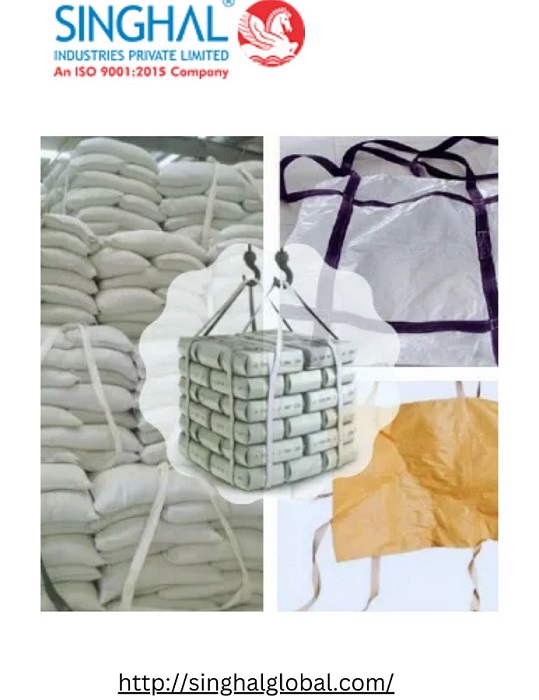
FIBC Jumbo Sling Bags are gaining immense popularity across various industries due to their durability, versatility, and cost-effectiveness. Also known as Jumbo sling bags, these flexible intermediate bulk containers (FIBCs) are a game-changer for transporting bulk materials. Whether you’re in the agricultural sector, construction, or any business needing efficient shipping solutions, understanding the features and benefits of these bags can greatly enhance operational efficiency.
What is a Sling Jumbo Bag?
The term “Sling jumbo bag” refers to large, flexible bags designed specifically for transporting and storing bulk materials. These bags are made from woven polypropylene (PP), which is a strong, durable, and lightweight plastic material. Unlike traditional paper or other rigid containers, jumbo sling bags are designed to be flexible, allowing for easy loading, unloading, and storage. Their structure typically features four lifting loops, which facilitate easy handling with forklifts or cranes.
Features of a Jumbo Sling Bag
A jumbo sling bag is engineered to meet the demanding needs of various industries. One of the most notable features of a PP sling bag is its significant load capacity. These bags can typically hold between 500 to 2000 kilograms, making them ideal for transporting bulk materials such as grains, sand, chemicals, and construction materials.
Another key feature of these bags is their reusability. Unlike single-use packaging options, Jumbo sling bag can be designed for multiple trips, offering not just cost savings but also reduced environmental impact. The bags are made from UV-stabilized polypropylene, which ensures their durability under varying weather conditions.
Moreover, the design of sling jumbo bags can be customized to fit specific needs. They can be constructed with different wall thicknesses, matching your requirements based on the type of material being stored or transported.
Applications of FIBC Jumbo Sling Bags
The versatility of FIBC jumbo sling bags makes them suitable for many applications. In the agricultural sector, they are widely used for storing and transporting grains, seeds, and fertilizers. The breathable material allows for the aeration of stored products, reducing the risk of spoilage and pest infestations.
In construction and demolition, a jumbo sling bag is often utilized for collecting debris, sand, and gravel, providing a convenient and organized manner to transport these materials. The ease of handling these bags can improve labor efficiency on-site.
Furthermore, various industries such as chemicals, pharmaceuticals, and food also utilize these bags for transporting powders and granular materials, ensuring safe and hygienic conditions throughout the supply chain.
Benefits of Using PP Sling Bags
Switching to PP sling bag can offer numerous benefits over traditional packaging options. One of the most significant advantages is cost-effectiveness. Given their high capacity and reusability, businesses can save on packaging costs. Moreover, these bags take up less space and can be stored flat, making logistics more manageable.
Another important benefit is the protection these bags provide for the materials within. The woven structure of a PP sling bag is designed to be resistant to moisture, dust, and other contaminants, ensuring the integrity of the contents during transit and storage.
Additionally, eco-friendliness is a crucial consideration for modern businesses. FIBC jumbo sling bags can reduce waste by enabling reusability and biodegradability options. The industry is seeing a shift toward sustainable materials, with more companies prioritizing packaging that aligns with eco-conscious practices.
Selecting the Right FIBC Jumbo Sling Bag
Choosing the right jumbo sling bag is essential for maximizing performance and efficiency. When selecting a PP sling bag, consider factors such as the type of material to be stored, the required load capacity, and the handling methods involved.
If you’re dealing with heavy materials, opting for a thicker, more durable material may be necessary. Additionally, you can choose from options that feature different types of closures or open top designs, depending on how you plan to load and unload the materials.
Finally, ensure that you purchase your bags from a reputable supplier who can provide documentation regarding their quality standards and compliance with industry regulations. This is crucial to ensure the bags meet safety and quality criteria for whichever application you require.
Future Trends in FIBC Jumbo Sling Bags
As industries evolve, so too does the technology and design behind jumbo sling bags. The future of FIBC bags is bright, with innovations aimed at enhancing sustainability and performance. One such trend is the development of biodegradable PP sling bags that minimize environmental impact without compromising performance.
Another noteworthy advancement is the incorporation of RFID technology for tracking and monitoring the materials within the bags during transit. This can greatly enhance supply chain efficiency and provide real-time data for operations managers.
Furthermore, as industries strive for more sustainable practices, manufacturers will likely continue to improve recycling processes for used FIBC bags, thereby creating a circular economy around this essential packaging solution.
Conclusion
FIBC Jumbo Sling Bags stand as a testament to modern packaging solutions, offering durability, versatility, and adaptability to various industries. Their importance cannot be overstated; they simplify the logistics of bulk material handling while significantly reducing costs and environmental impact.
Whether you’re in agriculture, construction, or manufacturing, understanding the various applications and benefits of PP sling bags can empower you to make informed decisions. As technology continues to improve, the future of these bags looks promising, heralding a new era of responsible packaging solutions.
FAQ
Q1: How much weight can a Jumbo Sling Bag hold?
A jumbo sling bag can typically hold between 500 to 2000 kilograms, depending on its design and the materials used. Always check the specifications before use to ensure safe handling.
Q2: Can FIBC Jumbo Sling Bags be reused?
Yes, FIBC Jumbo Sling Bags are designed for multiple trips. Their durable polypropylene material allows for reusability, making them a cost-effective and environmentally friendly option.
Q3: Are FIBC Bags suitable for food-grade materials?
Yes, there are specific FIBC bags that are manufactured to meet food safety standards. Always ensure that any bags used for food materials are specifically designated as food-grade to guarantee safety and compliance.



Leave a Reply